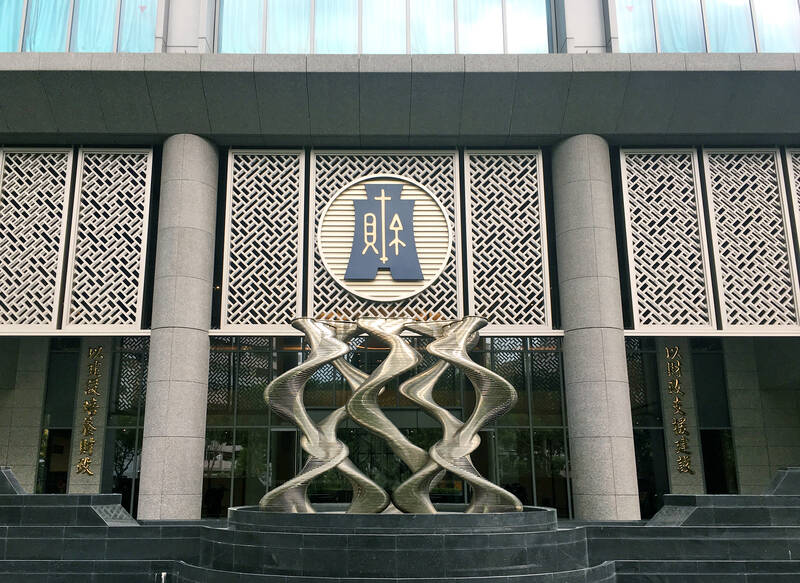Government tax revenue last month fell 13 percent annually to NT$176.7 billion (US$5.88 billion), as the Lunar New Year holiday shortened the number of working days and weighed on almost all tax categories, the Ministry of Finance said yesterday.
Securities transaction tax revenue fell 60.7 percent to NT$6.9 billion, the steepest fall since February 2009 during the height of the global financial crisis, mainly because the local bourse closed for nearly two weeks for the holiday, the ministry said.
Daily market turnover averaged NT$277.1 billion last month, dropping more than 20 percent from NT$348 billion for the same time last year, as investors stayed on the sidelines to avoid holiday shocks, the ministry said in its monthly report.

Photo: Clare Cheng, Taipei Times
Foreign capital inflows recovered after the holiday, but it remains to be seen whether the trend can be sustained amid global inflation and interest rate hikes by central banks, which is unfavorable for risky assets, the report said.
Revenue from land value tax plunged 52.1 percent year-on-year to NT$5.1 billion, as the number of taxable cases slumped 42.5 percent to 36,739, it said.
The ministry attributed the poor showing to fewer working days, interest rate hikes and unfavorable government policy.
Taichung recorded the steepest decline in tax revenue, followed by Taipei and New Taipei City, the ministry said.
Fewer working days also led to lower revenues from business tax, sales tax and corporate income tax, the report said.
Personal income tax revenue was the only exception, with a 1.3 percent increase, helped by interest incomes and corporate bonuses, it said.
The ministry also revised tax revenue for last year, when a surplus beat the government’s target by 19.2 percent, or NT$523.7 billion.
The government plans to share the windfall with the public by distributing NT$6,000 in cash to all Taiwanese and qualifying foreign residents.
Separately, a tax incentive program aimed at encouraging people to purchase energy-efficient appliances is to be extended by two years to June 14, 2025, the ministry said on Tuesday.
The program, introduced in 2019, offers tax breaks of NT$500 to NT$2,000 for purchases of refrigerators, dehumidifiers and air-conditioners that meet Level 1 or 2 energy-saving standards specified by the Bureau of Energy’s rating program.
The program was extended by two years in 2021 and was set to expire on June 14 before the latest extension, the ministry said.
As of Dec. 31 last year, tax rebates totaling NT$11.9 billion had been approved for purchases of 7.2 million energy-saving home appliances, government data showed.
Additional reporting by CNA

South Korea’s equity benchmark yesterday crossed a new milestone just a month after surpassing the once-unthinkable 5,000 mark as surging global memory demand powers the country’s biggest chipmakers. The KOSPI advanced as much as 2.6 percent to a record 6,123, with Samsung Electronics Co and SK Hynix Inc each gaining more than 2 percent. With the benchmark now up 45 percent this year, South Korea’s stock market capitalization has also moved past France’s, following last month’s overtaking of Germany’s. Long overlooked by foreign funds, despite being undervalued, South Korean stocks have now emerged as clear winners in the global market. The so-called “artificial intelligence

NEW IDENTITY: Known for its software, India has expanded into hardware, with its semiconductor industry growing from US$38bn in 2023 to US$45bn to US$50bn India on Saturday inaugurated its first semiconductor assembly and test facility, a milestone in the government’s push to reduce dependence on foreign chipmakers and stake a claim in a sector dominated by China. Indian Prime Minister Narendra Modi opened US firm Micron Technology Inc’s semiconductor assembly, test and packaging unit in his home state of Gujarat, hailing the “dawn of a new era” for India’s technology ambitions. “When young Indians look back in the future, they will see this decade as the turning point in our tech future,” Modi told the event, which was broadcast on his YouTube channel. The plant would convert

‘SEISMIC SHIFT’: The researcher forecast there would be about 1.1 billion mobile shipments this year, down from 1.26 billion the prior year and erasing years of gains The global smartphone market is expected to contract 12.9 percent this year due to the unprecedented memorychip shortage, marking “a crisis like no other,” researcher International Data Corp (IDC) said. The new forecast, a dramatic revision down from earlier estimates, gives the latest accounting of the ongoing memory crunch that is affecting every corner of the electronics industry. The demand for advanced memory to power artificial intelligence (AI) tasks has drained global supply until well into next year and jeopardizes the business model of many smartphone makers. IDC forecast about 1.1 billion mobile shipments this year, down from 1.26 billion the prior

People stand in a Pokemon store in Tokyo on Thursday. One of the world highest-grossing franchises is celebrated its 30th anniversary yesterday.